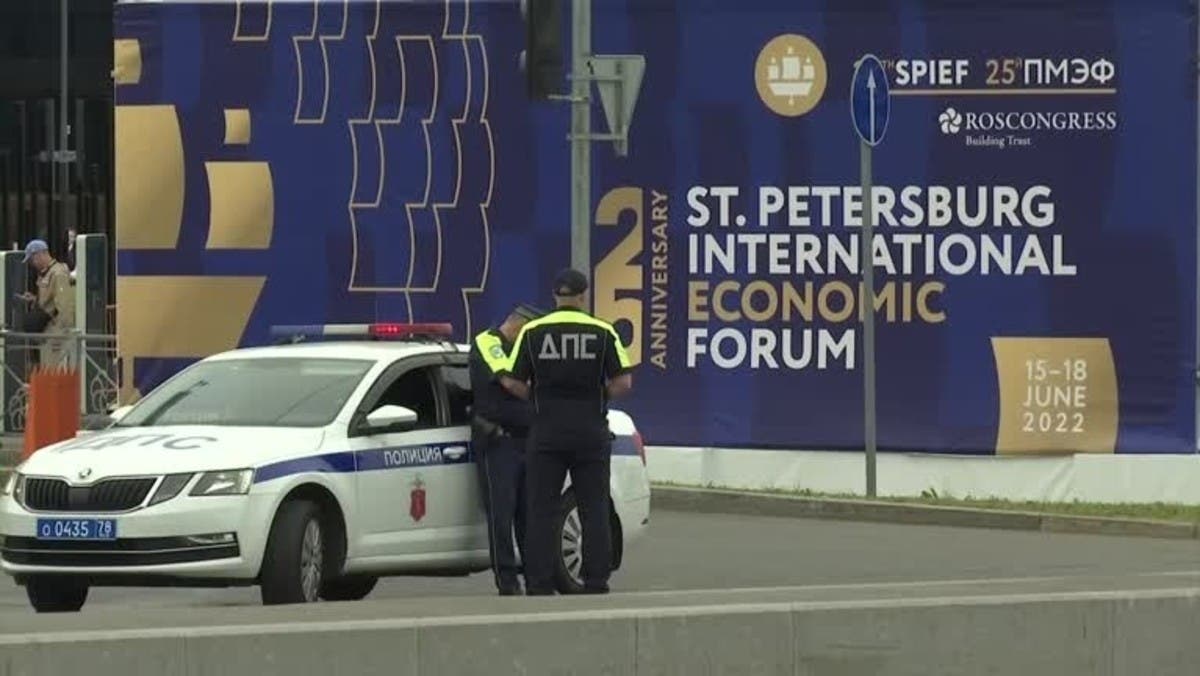Organizers of Russia’s showpiece investment gathering are telling foreign participants to be sure to bring cash — not necessarily for making investments, but for spending money.
With Russia under wide sanctions after sending troops into Ukraine, most foreign bank cards don’t work in the country. The advice for those at the St. Petersburg International Economic Forum, which starts Wednesday and runs through Saturday, is a quiet acknowledgment of the economic difficulties Russia faces as it tries to promote itself to international businesses.
For all the latest headlines follow our Google News channel online or via the app.
The attendance list is another sign of Russia’s uncertain economic prospects. As of early June, about 2,700 business representatives from 90 countries were expected to attend — far below the 13,500 participants from 140 countries reported last year.
Organizers did not provide a list of foreign businesses attending, but the program for the more than 100 panel discussions showed few speakers from outside Russia. Some were from China, and the trade minister of the United Arab Emirates was scheduled. Denis Pushilin, leader of the Ukrainian separatist Donetsk People’s Republic, announced he plans to attend.
The forum, often characterized as Russia’s analogue of the World Economic Forum in Davos, Switzerland, aims to portray the country as orderly and full of attractive opportunities for clever and adventurous investors. This year’s program carries the theme to an extent that is overly optimistic for Russia’s straitened circumstances.
Several sessions focus on developing Russia’s tourist potential, despite the difficulty of foreigners even getting to the country amid flight bans by Western countries. Another session proclaims Russia as “The Land of Opportunity” but its introduction complains that “the policy of ‘abolishing Russian culture’ abroad, closing borders and interruption of banking services makes it difficult to choose Russia as a place to study or work.”
Less than four months after wide-ranging sanctions were imposed and hundreds of foreign companies pulled out of Russia, the full effect on the Russian economy is unclear.
Shuttered storefronts give Moscow’s shopping malls a foreboding atmosphere, but officials claim Russian entrepreneurs can step in to revive the consumer economy — as shown over the weekend when a Russian tycoon opened the first of the restaurants he bought from McDonald’s.
There was another reminder of how economic ties to the West have been cut Wednesday as Swedish furniture giant Ikea — which suspended its Russia operations in March — said it would now seek to “find new ownership” for its four factories there. On the retail side, “the workforce will be reduced, meaning that many co-workers will be affected,” Ikea said.
The ruble, after losing half its value in the early days of the Ukraine conflict, has strengthened to levels not seen in several years after Russia imposed strict financial measures like capital controls, a heartening image for Russians but possibly a long-term problem making exports more expensive.
One of the most closely watched sessions at the forum is likely to be Thursday’s panel on Russia’s economic prospects featuring heavyweights including Finance Minister Anton Siluanov and Elvira Nabiullina, head of Russia’s central bank.
Nabiullina so far has given ambiguous assessments, saying recently that “the effects of the sanctions are less acute than we feared … but it is premature to say that the full effect of the sanctions has manifested itself.”
One of the forum’s most popular events won’t be held: President Vladimir Putin’s question-and-answer session with executives of major international news organizations. Instead, he will meet with the heads of Russian news media and “front-line reporters” from Russia’s military operation in Ukraine, according to Kremlin spokesman Dmitry Peskov.
A representative of the Taliban also is expected, although Russia formally designates the Taliban as a terrorist group. Kremlin spokesman Peskov said this didn’t mean Russia would recognize the Taliban as the legitimate government of Afghanistan.
“There is no talk of recognizing (the Taliban),” Peskov said Wednesday. “However, there are many humanitarian problems that obligate many countries to come into contact with representatives of the Taliban,” he added.
Read more:
Russia’s McDonald’s renamed ‘Vkusno i tochka’ ahead of grand re-opening
Ikea to ‘scale down’ Russia, Belarus operations over Ukraine war
Putin to host Russia’s flagship forum, defying COVID-19 risk


 World3 years ago
World3 years ago
 World3 years ago
World3 years ago
 Business11 months ago
Business11 months ago
 Entertainment7 years ago
Entertainment7 years ago
 World7 years ago
World7 years ago
 Entertainment7 years ago
Entertainment7 years ago




